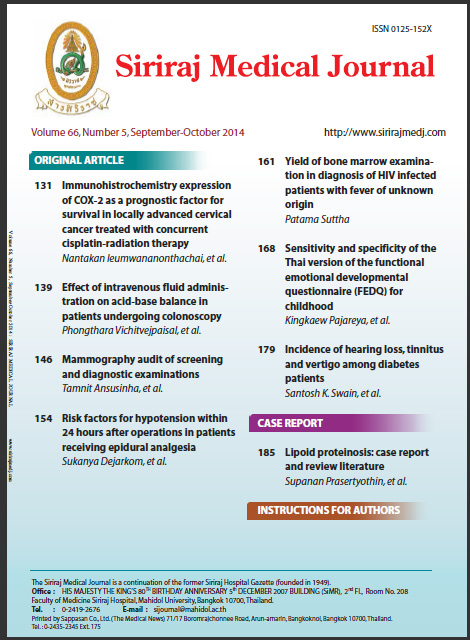Incidence of Hearing Loss, Tinnitus and Vertigo among Diabetes Patients
Abstract
Background: Diabetes mellitus has been a cause of many a health ailment. The relationships between inner ear manifestations, hearing loss (HL), tinnitus and vertigo as well as diabetes are not established.
Objective: To assess prevalence of HL, tinnitus and vertigo among diabetic patients in a typical Indian tertiary care hospital in a cross-sectional study.
Methods: 240 patients were categorized according to their age (< 60 years and > 60 years), gender, chronicity of diabetes mellitus (<10 years and >10 years), related complications (hypertension, nephropathy and retinopathy) and modalities of diabetic treatment taken by patients. Detailed examinations of their ears with an otoscope and the tuning fork test, including the pure tone audiometry were done in a sound proof room at frequencies of 500-8000 Hz.
Results: Ear manifestations were found among 240 diabetes patients: HL in 148 cases (61.67%), tinnitus in 70 cases (29.17%) and vertigo in 17 cases (7.08%). The association of age (p=0.21) and sex (p=0.58) with HL, tinnitus and vertigo were not statistically significant. Nevertheless, the duration of diabetes as well as the treatment modalities for it, in relation to these ailments were statistically significant (p=0.07) and (p=0.05), respectively.
Conclusion: HL, tinnitus and vertigo were better controlled by intake of insulin than oral hypoglycemic agents and diet regulation.
Keywords: Diabetes, hearing loss, tinnitus, vertigo
Downloads
Published
How to Cite
Issue
Section
License
Authors who publish with this journal agree to the following conditions:
Copyright Transfer
In submitting a manuscript, the authors acknowledge that the work will become the copyrighted property of Siriraj Medical Journal upon publication.
License
Articles are licensed under a Creative Commons Attribution-NonCommercial-NoDerivatives 4.0 International License (CC BY-NC-ND 4.0). This license allows for the sharing of the work for non-commercial purposes with proper attribution to the authors and the journal. However, it does not permit modifications or the creation of derivative works.
Sharing and Access
Authors are encouraged to share their article on their personal or institutional websites and through other non-commercial platforms. Doing so can increase readership and citations.











